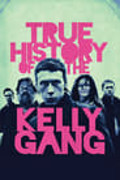
Directed by
Justin Kurzel
124 minutes
Rated MA
Reviewed by
Bernard Hemingway

True History Of The Kelly Gang
Synopsis: The sort-of story of Ned Kelly (George MacKay) and how he became Australia’s most famous bushranger.
Bloodily brutal, sometimes bizarre and often brilliant Justin Kurzel’s film will probably only win a small cadre of supporters domestically where it is on “limited theatrical release” before streaming on Stan but those relative few will no doubt be ardent champions of it. Overseas, where there will less familiarity with the Kelly legend, it hopefully will find a more enthusiastic audience.
Based on a 2000 novel by Peter Carey to which I assume writer Shaun Grant who wrote the script for Kurzel’s stunning 2011 debut Snowtown has been as faithful as possible, as the opening credits tell us the True History of the Kelly Gang is anything but true to its title. Quite the opposite in fact. Whilst there are broadstroke consonances with the facts of Kelly’s life, the Carey/Kurzel version is a far cry from the legendary colonial anti-hero so central to the Australian mythos and wh0 was embodied as such by Mick Jagger in 1970 and Heath Ledger in 2003.
The film opens with Kelly writing the true story of his life for his unborn son (the real Kelly didn’t have one), its narrative beginning with a twelve-year old Ned (a sterling performance from Orlando Schwerdt) and his siblings with his mother Ellen (Essie Davis, excellent in her role) eking out a living on what must be the worst claim in history: a grey wasteland that were it not for the dead trees that litter it might be the surface of the Moon. Ned's mother services the local policeman (Charlie Hunnan) to keep his drunk of a father out of jail, When Ned’s father dies Ellen sells the boy to bushranger Harry Power (Russell Crowe, very effective in a small role) who forces him to partake in his skullduggery. Ned wants no part of the outlaw life but his family history being what it is eventually he takes up arms against the traps.
Like last year’s Judy & Punch, True History of the Kelly Gang is a free re-imagining of the past but Kurzel makes that film’s liberties look very tame. There’s not just punk music and strobe lighting but Ned and his gang dress in women’s clothes for their raids and gone is the beard and the rugged bushranger’s attire for natty modern-looking casual wear. Ned himself is a conflicted soul, his world view warped by his harshly possessive mother who has done her best to eradicate Ned’s essentially soft nature in the name of survival. As Ned, British actor MacKay who is a bit of an IT-boy at the moment, also starring in 1917, sports an Australian, rather than the typical-for-the-role, Irish accent, and is wonderfully effective in bringing this sensitivity to life with Ned forming an implied homo-erotic relationship with Constable Fitzpatrick (another British actor, Nicholas Hoult) that forms one of the main threads running through the story.
These potentially outré points of difference would mean nothing if Kurzel had not bound them into a fabric of startling originality wrought with the aid of the consummate skill of his production team. Ari Wegner’s outstanding cinematography is endlessly inventive and Kurzel’s brother Jed delivers an unobtrusive but empathetic score. It is however Kurzel’s bold directorial vision and sweeping realization of it that ultimately impresses, most dramatically in the climatic siege at Glenrowan.
If there is one criticism of the film it is that the narrative gets a little woolly in the middle section particularly as it concerns the relationship of Ned’s mother with an American adventurer (Marlon Williams) who appears suddenly in the story and disappears in a similar manner. A closing scene shot in the Victoria State Library ‘s La Trobe Reading Room seems also, particularly for the cost involved, questionable even if it does nicely address Australia’s roots in its convict past.
Notwithstanding, although it has appeared in theatres in only the second week of 2020 and even more unfortunately amidst awards-season hoopla I’d be surprised if I see a better film all year. Catch it on the big screen while you can. .

Want more about this film?


Want something different?




